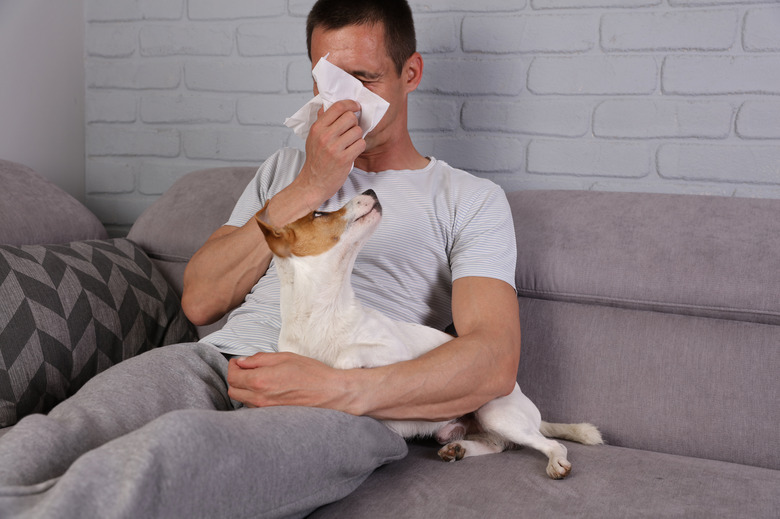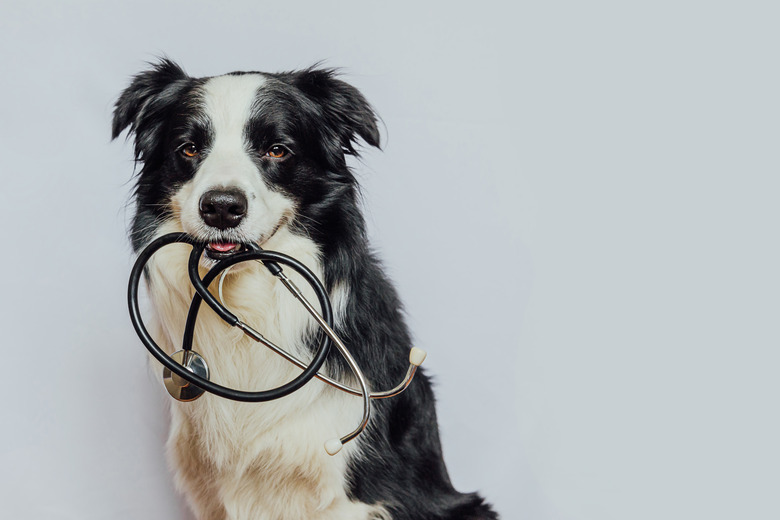Can Dogs Get Sick From A Human Cold Or Flu?
When cold and flu season hits, there's always worry about catching sickness. If it does enter the home, are animals at risk? Nothing is more stressful than a home with sick pets. Many dog owners will do all they can to keep their pet's health in good condition. Yet, are there certain sicknesses that dogs can get from pet owners?
While there is no concrete answer to this, science does seem to lean towards dogs being in the clear if their owner comes down with an illness like a cold.
Can dogs get sick from a human cold or flu?
Can dogs get sick from a human cold or flu?
The chances of dogs catching a cold from humans is slim to none. The viruses that cause cold-like symptoms are species specific. This means the viruses that cause cold-like symptoms in humans and in dogs rarely jump from one species to the other. There are 200 or so viruses that cause the common cold. They are not contagious to domesticated animals, including dogs. If you come down with a cold, your dog should be safe and you can continue to interact with them just as you normally would.
However, the same cannot be said for flu-like symptoms. According to the Centers for Disease Control and Prevention, the flu can jump from species to species. This is known as a zoonotic disease. So, if you come down with the flu, your dog is at risk to catch it. The flu spreads through the air, so if you are sick — it might be in your best interest to keep some distance from your pet and avoid close contact if you can in order to keep them safe.
Research from 2014 showed that human influenza viruses can infect dogs, particularly the H1N1 strains and H3N2 strains. However, it should be noted that while dogs can contract some human influenza viruses, they don't appear to actually become sick.
What are the symptoms of a dog cold or flu?
If you sense your dog may be getting sick, it's important to check for the same symptoms you'd expect from a common human cold:
- Sneezing
- Coughing
- Runny nose
- Watery eyes
It's important to note that these main symptoms could be just a cold for your dog, but they could also be symptoms of more serious conditions, like kennel cough, dog flu or canine influenza, or even canine distemper.
What diseases can your dog catch from you?
What diseases can your dog catch from you?
While dogs seem to be in the clear when it comes to the common cold, the jury is still out on how susceptible dogs can be to other infectious diseases from humans. There are several bacterial infections that dogs can potentially get from people. For example, salmonella bacteria can cause illness in both dogs and humans, and you can spread a salmonella infection to your dog.
Transmission of salmonella is fecal to oral transmission. If you have salmonellosis and don't thoroughly wash your hands after using the bathroom, you can potentially pass it to your dog. This can spread if you pet them afterward, prepare their food, or allow them to lick you while still having the bacteria on you from feces.
Another bacteria known as campylobacter jejuni can cause infection in both dogs and humans. If infected, watery diarrhea, decreased appetite, and fever can appear. This bacterial infection can also be transmitted fecal to oral.
Lastly, humans can carry methicillin-resistant staphylococcus aureus (MRSA) on their skin without any symptoms at all. According to the Center for Disease Control and Prevention, dogs can potentially contract the illness from humans who have the bacteria on their skin. In dogs, this can cause infections of the skin, respiratory tract, and urinary tract.
What diseases can you catch from your dog?
What diseases can you catch from your dog?
Dgs bring joy and comfort into any home, and it should be known that there is also risk involved when adding a family pet like a dog to the household. Dogs do have the potential to spread harmful germs, illnesses, and diseases to you.
There are several viral, fungal, bacterial, and parasitic illnesses that pass between humans and infected animals — including your dog. Brucellosis, a bacterial disease that can cause flu-like symptoms in humans, can be spread through contact with animals carrying the bacteria. Symptoms such as appetite loss, chills, stomach pain, headaches, and weight loss can occur.
Leptospirosis is another type of bacterial infection that can be spread from dog to human, typically through the urine of a dog that has the bacteria. Symptoms including fever, digestive discomfort, and aches and pains can occur.
A skin and scalp diseases called ringworm is caused by a fungus that can be spread by touching an object or surface that came in contact with the fungus. Every surface in the home can be at risk for contamination. So, it's important to avoid direct contact with an infected animal. On an infected dog, the symptoms of ringworm may be present on hairless areas, with scaling, red, and crusty spots.
How to help your dog from getting sick
How to help your dog from getting sick
One of the most obvious and best ways to keep your dog from getting sick is simply by washing your hands regularly. Always wash or sanitize your hands after handing pet food, picking up dog feces, and petting other animals (especially farm animals).
Keeping your dog up to date on their vaccinations is also one of the best ways to keep your pet's health in tip-top shape as well as using veterinary-recommended flea, tick, and intestinal parasite — preventive medications.
It's important to always keep an eye on your pet to prevent them from eating rotten food or drinking contaminated water. These could contain bacteria, viruses, or parasites from other animals that could make your dog very sick. Keep garbage can lids tight in the home, and avoid any public water bowls.
Basic hygiene is also very important when it comes to keeping your dog from getting sick. By washing your dog's bedding regularly, you can quickly and easily take away a place where bacteria and viruses fester. If you do notice your dog coughing or acting differently, take them to see a veterinarian immediately. This could be s sign of canine influenza or canine infectious respiratory disease.
The bottom line
The bottom line
Risk is involved when it comes to contagious illnesses and having family pets. There is a chance that you could give something to your dog and vice versa. However, there are many ways to prevent the spread of infection from human to pet and from pet to pet with simple preventative measures like hand-washing and vaccinations.
References
- American Kennel Club: Can Dogs Get Colds?
- Business Insider: Can dogs catch human colds? No, but they can get their own version of a cold
- National Library of Medicine: Evidence for Subclinical Influenza A(H1N1)pdm09 Virus Infection among Dogs in Guangdong Province, China
- Healthline: Brucellosis – What diseases can you get from your dog?
- American Animal Hospital Associatiion: 5 WAYS TO KEEP YOUR PET DISEASE FREE
- CDC: Key Facts about Canine Influenza (Dog Flu)



